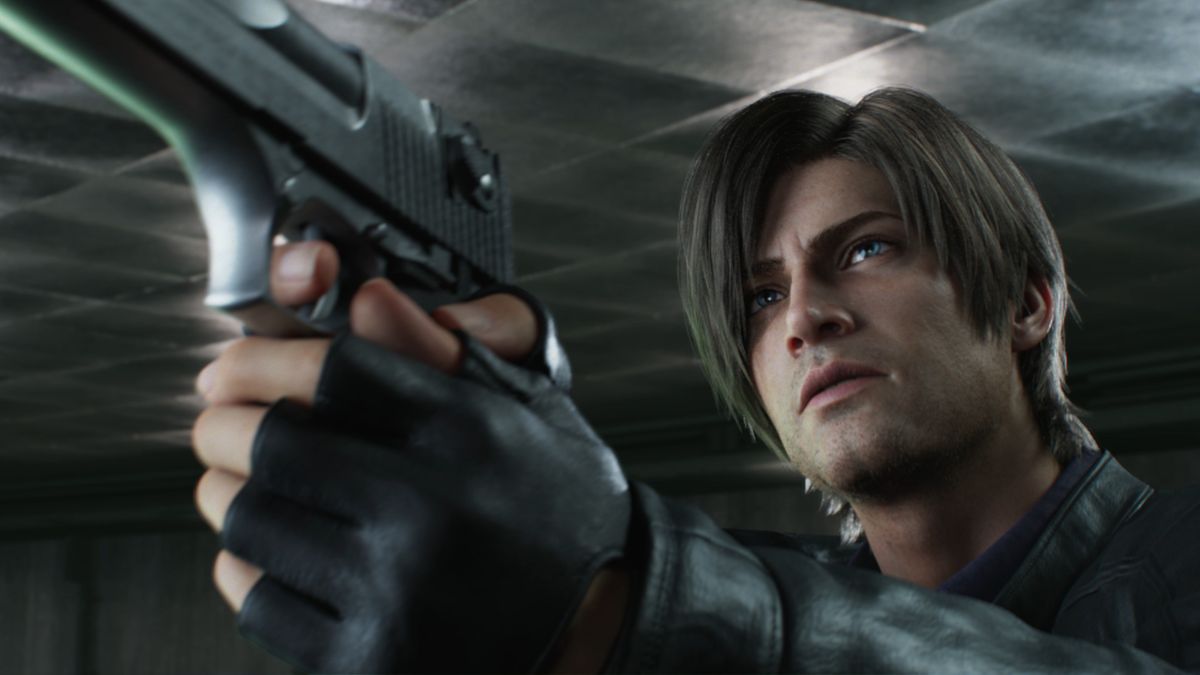12DOVE Verdict
While light on scares, Resident Evil Infinite: Darkness tells a story that will draw in fans of the series eager to see Leon S. Kennedy and Claire Redfield fight off the undead once more
Why you can trust 12DOVE
Resident Evil is quietly making itself at home on Netflix. The first of two planned shows on the streamer, Infinite Darkness aims to step out of the shadow of its middling-to-good CGI and live-action forebears, and mirror a game series that has reached new (very literal, in some cases) heights.
Does it succeed? Hardcore Resident Evil fans are likely to lap up Infinite Darkness’ winding tale of conspiracies and civil wars set against the usual backdrop of man-made viruses and the skin-tearing undead. More casual viewers, however, will soon forget the by-the-numbers thriller plot and inconsistent animation that never quite commits to its horror roots.
Resident Evil: Infinite Darkness takes place between Resident Evil 4 and Resident Evil 5 in 2006 and sees Leon S. Kennedy drafted in by the White House to investigate a cyber attack that could have severe geopolitical repercussions. Halfway across the world, Claire Redfield is working for human rights organization TerraSave (returning from CGI movie Degeneration) in the fictional country of Penamstan, a country ravaged by conflict – and a location that sows the seeds for a grand conspiracy that is in danger of reaching the Oval Office.
The four-episode run (with each episode lasting around 25 minutes) intertwines the two narratives from the get-go and kicks off with a zombie attack on the White House. While the twists are telegraphed well in advance, Infinite Darkness revels in its cheesy plot as it spirals out into the sort of shadowy, globetrotting adventure that could just as easily have been released as DLC during the game series’ pre-Resident Evil 7 years.
But therein lies one of the show’s biggest drawbacks: mileage may vary for certain Resident Evil fans. Those looking for a dose of house-based horror a la Resident Evil 2 Remake or Resident Evil 7 may feel disappointed. This is harkening back to the more action-heavy Resident Evil 4 to Resident Evil 6 era, and all the pros and cons that come with it – including some heavy-handed nods and Easter eggs to the games of that generation.
The series’ trademark scares are few and far between, while Infinite Darkness’ place on the timeline comes at the cost of any real peril. We know the two main characters – voiced ably by their Resident Evil 2 Remake actors – will survive the events.
It’s undeniable, though, that Leon S. Kennedy and Claire Redfield are magnetic leads and Infinite Darkness wisely pins its hopes on the pair. The charm and light flirting between the duo makes you yearn for a show that goes in a different direction entirely – a fully-fleshed out adaptation of Resident Evil 2 in this CGI style wouldn’t have been a bad idea, for starters.
Unfortunately, Leon and Claire’s paths, sadly, rarely converge; Leon is tasked with one covert mission – and his time spent on a submarine ranks as a high watermark for the show, echoing some of Resident Evil’s finest claustrophobic environments. It’s here where the show succeeds, capably balancing light horror and the larger-than-life plotline of double crosses and espionage to good effect. Claire’s own separate detective work, though, is reflective of the show’s flaws: half-baked and rarely afforded the time and attention it deserves.
That unfocused narrative is a throughline that runs through Infinite Darkness. In an attempt to juggle multiple new viewpoints and narratives, the show leans heavily on flashbacks, again and again, and once more for good measure. It makes for incredibly bewildering viewing as scenes are repeated across multiple episodes from different POVs, slowly building towards a grand reveal.

One moment in the third episode has the story flitting all over the place. It goes from flashback, a flashback-within-a-flashback, and finds time to sandwich a present-day scene in the middle. It’s all done to keep secrets hidden, but only serves to confuse and confound what would have worked better as a more linear plot. It does, however, mirror the game series’ weirdly entertaining penchant for unravelling story beats delivered in needlessly complex fashion. Meanwhile, new characters such as Jason, the ‘Hero of Penamstan’ and Shen May, are undercooked and feel like palette swaps of iconic characters of Resident Evil past.
There are also some minor technical issues in places worth noting. The lip syncing, a likely holdover from the localization process, is jarring at times, with the mouth folds and lip movements completely at odds with the English language dialogue. It’s not a deal-breaker but, in a show that demands complete immersion across its smattering of set-pieces and action sequences, will leave many removed from the spectacle entirely. The animation, too, is similarly uneven. Some scenes are about as good as Resident Evil as looked in terms of photo-realism, while others – including the laughably jerky zombies that wouldn’t look out of place if backed by Yakety Sax – lack the sinewy grace that Capcom’s team can conjure up in the games.
Infinite Darkness is, ultimately, an inessential, yet oddly captivating slice of Resident Evil. As great as it is to see Leon and Claire strutting their stuff in another typically bonkers Resi story, the series is held back by spending more time on foreign policy than frightening its audience. Still, the show is fleeting fun for diehards – and a decent start as Resident Evil starts to expand its universe on Netflix.
Resident Evil: Infinite Darkness is streaming on Netflix from July 8.
Need more to watch on Netflix? Here are the best Netflix shows and the best Netflix movies.
More info
| Genre | Animation |
I'm the Senior Entertainment Writer here at 12DOVE, focusing on news, features, and interviews with some of the biggest names in film and TV. On-site, you'll find me marveling at Marvel and providing analysis and room temperature takes on the newest films, Star Wars and, of course, anime. Outside of GR, I love getting lost in a good 100-hour JRPG, Warzone, and kicking back on the (virtual) field with Football Manager. My work has also been featured in OPM, FourFourTwo, and Game Revolution.
Castlevania: Nocturne season 2 review: "Netflix's spin-off has its signature charm, but the original anime remains far superior"

League of Legends co-creator responds to report that Arcane was a "financial miss," says "people think we make things like Arcane to sell skins, when in reality we sell skins to make things like Arcane"
Most Popular


